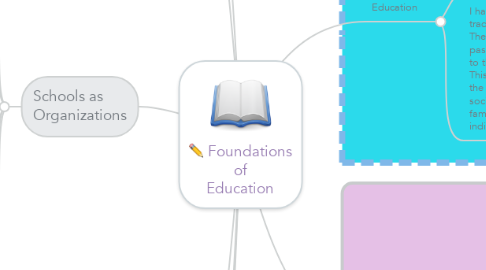Foundations of Education
저자: Rebekka Thompson

1. Politics of Education
1.1. Neo Liberal- Neo Liberalism was originally a European concept and is thought of as the middle ground between liberal and conservative views. I chose this view because I am somewhere in the middle.
1.2. I have chosen to take the traditional view of schooling. The traditional view aims to pass the best of things past to the future generations. This view focuses mostly on the traditional values of U.S. society centered around family, hard work, and individual initiative.
2. History of US. Education
2.1. I chose the reform centered around the 1974 Milliven V. Bradley case as the most important. Because it was for the desegregation of inner city school bus routes and led to more action being taken about segregation of inner city schools.
2.2. I decided to go with the historic interpretation of Stanley G. Hall on schooling. Hall believed that the school should fit the developmental stage of the child and not stifle the child's natural instinct.
3. Sociological Perpsectives
3.1. I selected the interactional theory which is primarily a deeper and critical extension of the conflict and functional theories. While the other two theories are more abstract and focused on the larger outcome this one focuses more on the smaller picture and what is going on inside the classrooms.
3.2. Out of the three effects on individual students the one I think makes the most impact is employment. Most students are motivated to continue schooling by there need for a job and want for a good one.
4. Philosophy of Education
4.1. Generic notions of Existentialism are that each individual is placed on this earth alone and must learn to make sense of it in their own way, that individuals must create themselves, and that it is the choice of the individual to be good or evil.
4.2. Key researchers of Existentialism include; the founder Soren Kierkegaard, Martin Buber, Karl Jaspers, Jean Paul Sartre, Maxine Green, Edmund Husserl,Martin Heidegger, and Merleau-Ponty.
4.3. The goal of education in Existentialism is to liberate the individual from the chaotic world. Existential education focuses on meeting the needs of the individual.
4.4. The role of the teacher in existentialism is largely as a role model who is to set an example of individuality and guide students to learn in their own ways.
4.5. Existential method of instruction is to have no methods, but to combine many methods and piece together new methods for each individual learner.
4.6. Existential curriculum is geared heavily towards the humanities with a main focus on Literature.
5. Schools as Organizations
5.1. The Limestone County representatives are Senator Athur Orr, Bill Holtzclaw, and Paul Bussman
5.2. The House of Representatives are Martha Roby, Mo Brooks, Terry Sewell, Bradley Byme, Gary Palmer, and Micheal D. Rogers.
5.3. The Alabama Superintendents are Tommy Bice, Tomas R, Tom Sisk
5.4. State Board of Education consists of Gov. Bentley, Philip C. Cleveland, Jeffery Newman, Yvette Richardson, Betty Peters, Stephanie Bell. Ella B. Bell, Cynthia Sanders McArty, and Mary Scott Hunter.
5.5. Limestone County Local Board members are Charles Shoulders, Marty Adams, Bradely Young, Earl Glaze, Bret McGill, Edward Winter, and Anthony Hillard.
5.6. The French School System is largely more centralized then the American school system. The school system in France is controlled by the central government even on the class room level. French classrooms are also more focused on linquistics than American classrooms.
6. Curriculum and Pedagogy
6.1. The History and Philosophy of education help to explain why school systems and curriculum look like they do today. The textbook outlines four different types of curriculum in the 20th century.
6.2. The Social meliorist Curriculum was developed in the 1930s. It was philosophically social reconstructionist. The Social Meliorist focused on school as a place to reform the society.
6.3. Social Meliorist Curriculum Curriculum spawned from the writings of John Dewey who was concered with the impacts of schools on society. George Counts and Harold Ruggs expanded upon and radicalized the writings on Dewey to create a theory that schools should be the base of Social Reform or at the very least help solve society's fundamental problems.
6.4. Sociologist focus not only on what curriculum is taught, but why it is taught. Functionalist believe curriculum represents coding knowledge that students need to succeded in society.
6.5. Functionalist theory is based on the work of Emile Durkheim who wanted to combat the breakdown of modern society.
6.6. Modern Functionalist theory is based on works of Talcon Parsons and Robert Dreeben. It was developed in the United States to deal with the role of schools in preparing students to function in complex modern society.
7. Equality and Opertunity
8. Educational Inequality
9. Education Reform


